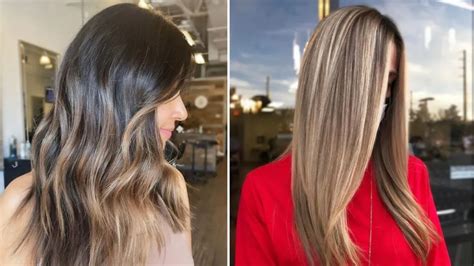Introduction
When it comes to elevating dark hair, two popular techniques reign supreme: balayage and highlights. Both aim to add depth, dimension, and luminosity, but they achieve these goals distinctly. Understanding the differences between these techniques is crucial for making an informed decision. This article delves into the details, exploring the four key factors that set balayage apart from highlights on dark hair.

1. Application Technique
Balayage:
– Freehand painting technique
– Lightener is applied directly to the mid-lengths and ends, creating a natural sun-kissed effect
– Allows for precise control over placement and blending
– Creates a more gradual transition between shades
Highlights:
– Foiling or cap technique
– Lightener is applied to sections of hair that are separated by foil or a cap
– Results in more defined, contrasting strands
– Can create a bolder, more noticeable effect
2. Results
Balayage:
– Creates a soft, blended look with subtle highlights
– Can add warmth, depth, and dimension
– Gives the appearance of naturally sun-kissed hair
– Often requires multiple sessions to achieve desired results
Highlights:
– Produces more defined, contrasting strands
– Can create a bold, statement-making look
– Adds brightness and lift to the hair
– Can be more high-maintenance, requiring regular touch-ups
3. Cost and Maintenance
Balayage:
– Typically more expensive due to the time and skill required
– Requires less frequent touch-ups (every 4-6 months)
– Can be more expensive to maintain if a professional stylist is used
Highlights:
– Usually less expensive than balayage
– Requires more frequent touch-ups (every 6-8 weeks)
– Can be more affordable to maintain if done at home or by a less experienced stylist
4. Suitability for Dark Hair
Balayage:
– Ideal for dark hair as it creates a natural, blended look
– Can enhance the richness and depth of the hair
– Can be customized to complement the skin tone and hair style
Highlights:
– Also suitable for dark hair, but may create a less natural look
– Can be harder to blend on dark hair, especially if the hair is thick or coarse
– May result in a more contrasting, striped effect
Conclusion
Balayage and highlights offer distinct approaches to enhancing dark hair. Balayage creates a soft, blended look with subtle highlights, while highlights produce more defined, contrasting strands. The best choice depends on individual preferences, hair type, and desired results. For a natural, sun-kissed effect, balayage is the ideal option. For a bold, statement-making look, highlights may be more suitable.
